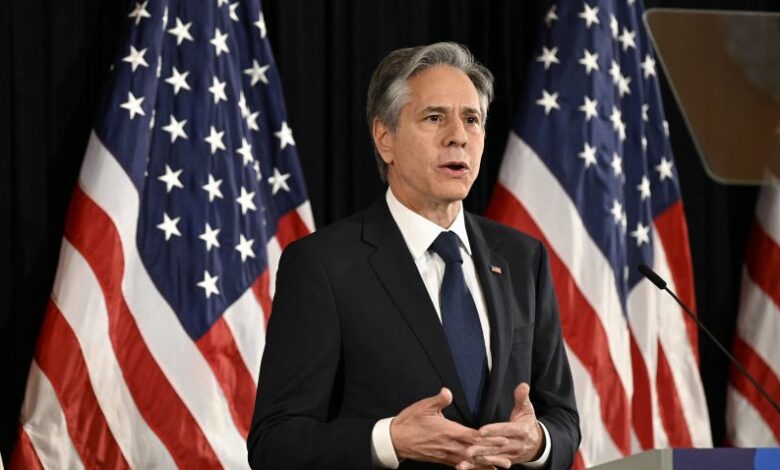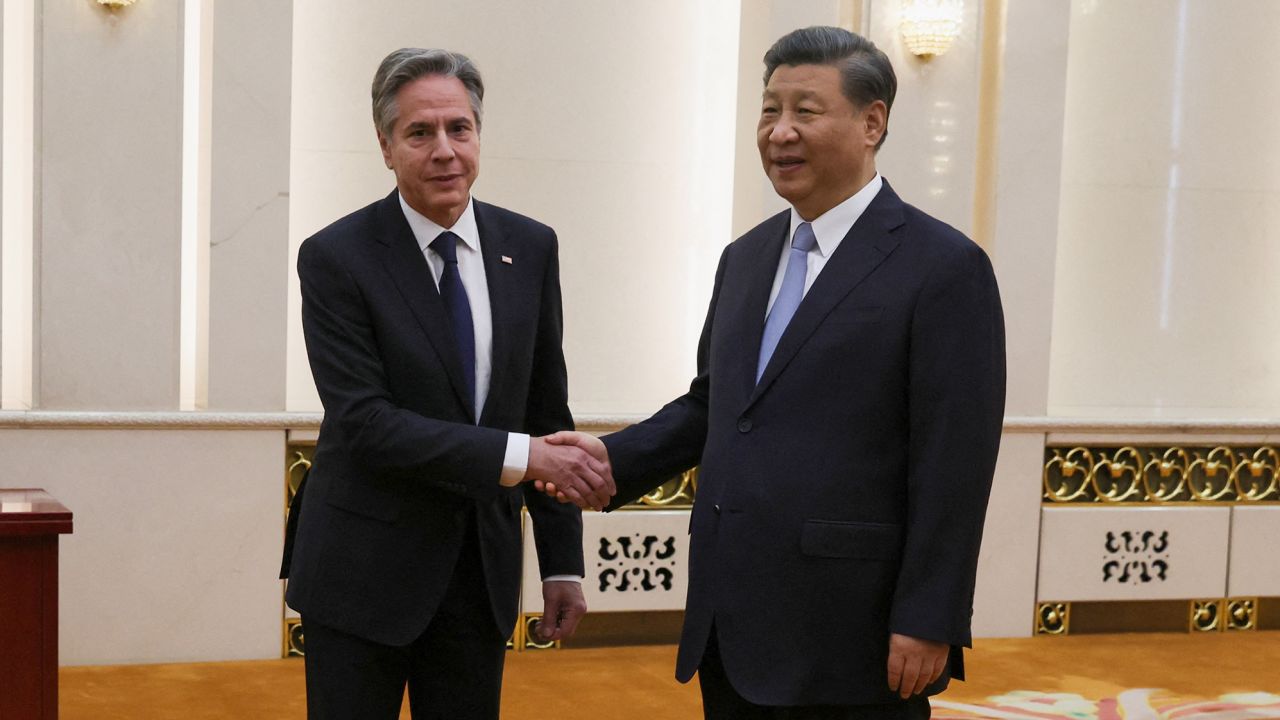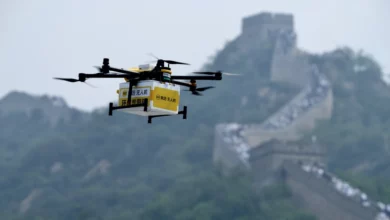
“We’re not going to have success on every issue between us on any given day, but in a whole variety of areas, on the terms that we set for this trip, we have made progress and we are moving forward,” Blinken said at a news conference in the Chinese capital. “But again, I want emphasize none of this gets resolved with one visit, one trip, one conversation. It’s a process.”
Blinken is the first US secretary of state to visit Beijing in five years, and his talks with senior Chinese officials were seen as a key litmus test for whether some sort of detente can be forged at a time of lingering distrust.
“I came to Beijing to strengthen high-level channels of communication, to make clear our positions and intentions in areas of disagreement, and to explore areas where we might work together on our interests, align on shared transnational challenges, and we did all of that,” Blinken said at a news conference at the end of his trip to the Chinese capital Monday.
He noted he had “an important conversation with President Xi Jinping,” and described his conversations with China’s top foreign affairs adviser Wang Yi and Foreign Minister Qin Gang as “candid, substantive and constructive.”
“We both agree on the need to stabilize our relationship,” he said.
The top US diplomat said his conversations touched on the Ukraine war and North Korea, and that he raised US concerns “shared by a growing number of countries about the (People’s Republic of China’s) provocative actions to the Taiwan Strait, as well as in the South and East China Seas.” He said the US position on Taiwan has not changed and pressed China over human rights.
Blinken emphasized in his remarks that the US was not seeking an adversarial relationship with China.
“There is a profound difference for the United States, and for many other countries, between ‘de-risking’ and decoupling,” Blinken said in explaining the US interest in defusing potential confrontations.
Blinken said China assured the US and other countries that it will not provide lethal aid to Russia and “we have not seen any evidence that contradicts that,” though he noted that China’s assurance was in keeping with repeated statements made in recent weeks.
“What we do have ongoing concerns about, though, are Chinese firms, companies that may be providing technology that Russia can use to advance its aggression in Ukraine. And we’ve asked the Chinese government to be very vigilant about that,” Blinken added.
High-stakes meeting between Blinken and Xi
Uncertainty around whether Xi and Blinken would meet during the two-day visit further highlighted the fraught US-China relations, and a failure to schedule a face-to-face meeting would have been seen by Washington as a slight, breaking with a number of previous visits from top American diplomats.
The meeting, which took place at Beijing’s cavernous Great Hall of the People, was only publicly announced by the US about an hour before it went ahead. It lasted roughly half an hour, beginning at 4:34 p.m. local time and ended at 5:09 p.m., a State Department official said.
“The world needs an overall stable Sino-US relationship, and whether China and the United States can get along has a bearing on the future and destiny of mankind,” Xi told Blinken, according to a Chinese readout of the meeting.
“China respects the interests of the United States and will not challenge or replace the United States. Similarly, the United States must also respect China and not harm China’s legitimate rights and interests,” Xi added. The readout said that Xi told Blinken that the world needs stable China-US relations and that the future of humanity hinges on both getting along.
The two global powers have been increasingly at loggerheads over a host of issues ranging from Beijing’s close ties with Moscow to American efforts to limit the sale of advanced technologies to China.
Key among those concerns has been repairing fractured lines of communication, which have broken down over the past year, especially when it comes to high-level military exchanges – raising concerns in Washington that a mistake or accident could quickly spin into conflict.
Earlier this year, a Chinese surveillance balloon that was detected floating across the US and hovering over sensitive military sites before ultimately being shot down by an American fighter plane sent relations plunging to a new low and resulted in Blinken scrapping an earlier Beijing visit.
This time, the diplomatic mission went forward.

“A choice needs to be made”
A roughly three-hour meeting between Blinken and Wang earlier Monday underscored the deep challenges in overcoming the mistrust and friction that has come to characterize the relationship.
The Chinese government’s growing clout internationally and increasingly authoritarian controls at home have pushed the US to reframe how it manages its relations with the power in recent years.
Repeating Beijing’s typical rhetoric, Wang blamed Washington’s “wrong perception” of China as the “root cause” of the decline in the two sides’ relations and demanded the US stop “suppressing” China’s technological development and hyping the “China threat,” according to a readout from Chinese state broadcaster CCTV.
“We must reverse the downward spiral of China-US relations, promote a return to a healthy and stable track, and jointly find the right way for China and the United States to co-exist in the new era,” Wang said, adding that Blinken’s visit came at “a critical juncture in US-China relations, where a choice needs to be made between dialogue or confrontation, cooperation or conflict.”
Wang also reiterated that Taiwan is one of one of China’s “core interests,” over which it “has no room for compromise or backdown.”
The self-ruling democratic island, which China’s ruling Communist Party claims but has never controlled, has increasingly been another flashpoint in the US-China relationship.
During the meeting, Blinken underscored the need for the countries to “responsibly” manage their competition through “open channels of communication” to ensure it “does not veer into conflict,” State Department spokesperson Matthew Miller said in a statement.
The US would continue to use its diplomacy to “stand up for the interests and values of the American people,” Blinken said, according to the statement, which described the talks as “candid and productive” and said they including discussion of potential cooperation on shared transnational challenges.
Advancing dialogue?
Overall, Wang’s comments took a more combative tone than those of China’s Foreign Minister Qin Gang, who met with Blinken the previous day. Qin said both sides agreed to “advance dialogue, exchanges and cooperation” and “maintain high-level interactions,” according to a readout from Beijing.
Blinken’s Sunday meeting with Qin, which stretched more than five hours and then wrapped with a working dinner, resulted in progress “on a number of fronts,” with both sides showing a “desire to reduce tensions,” a senior State Department official told reporters Sunday.
“Profound differences” between the US and China, however, were also clear during the meeting, the official added.
Neither side have mentioned concrete agreements so far.
While Qin holds the title of Foreign Minister, he wields less power than Wang, who directs the country’s foreign policy through his position among party’s core leadership.
Blinken’s original scheduled visit in early February had been agreed on as a follow-up to an amicable face-to-face between US President Joe Biden and China’s Xi on the sidelines of the G20 in Bali in November.
That meeting – the first in person between the two leaders as presidents – was seen a pivotal step in restoring certain lines of communication, which Beijing last year severed last year following a visit from then-US House Speaker Nancy Pelosi to Taiwan.
Both the US and China have played down expectations of a major breakthrough during Blinken’s visit.
Ahead of the meeting, Washington was careful to manage expectations, with a senior State Department official last week telling reporters that he does not expect “a long list of deliverables.”
Meanwhile, both sides are also navigating how the meetings play to their respective domestic audiences.
In the US, how strongly to counter China has become the topic of heated political debate – with some lawmakers slamming the Biden administration for sitting down with Beijing.
China views Washington as actively trying to thwart its development, and is also very much aware the US is headed into a presidential election cycle, where hawkish rhetoric against it may intensify further.
Its officials also meet Blinken in an environment where China’s state media and official rhetoric have long portrayed Washington as a bad-faith actor responsible for destabilizing ties.
CNN’s Philip Wang, Nectar Gan, Mengchen Zhang and Martha Zhou contributed to this report.




